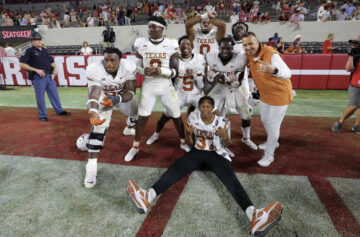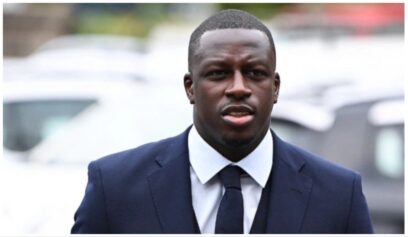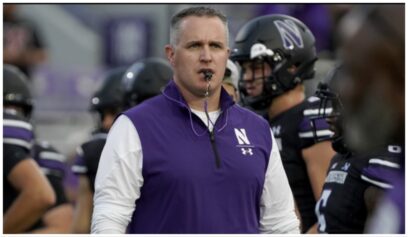Soccer. Football. Futbol.
No matter what you call it, it’s the world’s most popular sport, played across every continent and in every country. But while the sport dominates globally and attracts fans of all types, there is one debilitating aspect that the sport has not been able to avoid or eliminate, many feeling that it is both an expected and accepted occurrence.
Racism.
It’s amazing to think that a sport with such global participation can be plagued by blatant racism. Players from places such as Africa, Jamaica and South America play in leagues across Europe, Mexico and the United States. They play in countries like France, which accepted American Black soldiers underneath their flag when their own country wouldn’t let them fight under the Stars and Stripes. They play in countries like Brazil, a soccer crazed country which has a Black population of 97 million people, larger than that of the United States.
But despite the variety of geographic locations, religions and income levels of its fans and players, the sport of continues to suffer from incidents of racism, with the most recent example happening this past weekend in Serbia.
While playing in a Serbian SuperLeague game between Partizan Belgrade and Rad on Sunday, Everton Luiz, the star midfielder from Partizan, was subjected to horrific forms of racial abuse including verbal taunts and signs. In response, the club issued the following statement:
Partizan Belgrades Brazilian midfielder Everton Luiz leaves the field in tears on February 19, 2017, at the end of a Serbian championship match between Partizan and Rad, after racist remarks from Rads supporters. Every time he touched the ball, 28-year-old Everton Luiz was being monkey-screamed from a group of supporters of Rad Belgrade, the source said. Shortly before the end, the match was briefly interrupted when Rad supporters also waved a banner with an insulting message against the Brazilian.
The abuse became so bad that Luiz gave the crowd the middle finger, which led to a brawl between the teams. After that was broken up, Luiz left the field in tears. It’s bad enough that he has to face off against 11 opponents, but when he also has to compete against fans who come at him because of the color of skin, then it becomes an issue much bigger than the game. And that’s what soccer has unfortunately been subjected to – ugly racist incidents both on and off the field that mar the beauty of the game.
(Photo Credit: Mirror)
We’ve seen the violence in soccer, from fans fighting in the stands to umpires being killed over matches. But to basically accept that racist taunts and actions are part of the game is ridiculous; yet it’s a reality. Even worse, this isn’t new.
“Ive been suffering racist abuse during the entire 90 minutes and also was upset by the home players, who supported that. They were all attacking me. I want to forget this as soon as possible. I love Serbia and the people here, that is why I cried. But please say no to racism,” said Luiz after the game.
“Say no to racism.”
We discussed this very slogan used by the soccer world three years ago when more and more incidents were surfacing at an alarming rate.
In 2014, Barcelonas Dani Alves had a banana thrown at him. Alves, who is Afro-Brazilian, picked it up, ate it and jumped right back into the match, barely missing a beat. He was also subjected to monkey chants a year prior from from Real Madrid fans in 2013.
I know that people are fighting against this but these kinds of things keep happening, he told Reuters. I have been in Spain for 10 years and it has been happening since the first day. Drastic measures should be taken, for example, punishing the club more severely not just with a 1,000 or 2,000 fine [about $1,300 to $1,700.] You have to go a bit further. Sometimes you have to make an example. In England it doesnt happen and when it does the punishments are exemplary.
Spain seems to be quite a hotbed for racist behavior during soccer games, with even all-world player Neymar speaking out against the rampaging racism and xenophobia he’s witnessed and experienced there.
Mocking racists seems to be one method athletes have taken up to combat what they experience, something professional soccer player Papakouli Diop did to address his tormentors. Diop, who is from Senegal, told reporters, “They called me monkey and I turned and imitated a monkey. I’m tired of racism in football. And there’s a lot. I did the monkey dance to highlight the matter. I wanted people to know what happened.”
But players addressing it by mocking the ignorance isn’t going to solve everything, as racist fans will find another way to insult and demean their targets. The justice must be administered by the leagues and governing bodies. A great example of this was the reaction bythe French courts last month in response to four Chelsea football fans who pushed a Black man off of the train while yelling chants of “We’re racists!”
For showing us how keeping it real can go very wrong, these four were “convicted of racist violence and given suspended prison sentences”, fined, banned from Chelsea soccer games for five years and some of them lost their jobs. While this won’t cure racism in soccer, it just might give a few of them pause before acting ignorant, even when they’re outside of the stadium.
At sporting events in the US, racist actions in games aren’t tolerated, regardless of the level of competition. We’ve seen racist chants at high school games lead to removals and suspensions. Racist imagery was removed from the stands in Wisconsin and people have rejoiced as entire games, events and tournaments have been relocated due to attacks on equality.
Maybe Spain, in particular, should adopt the actions of Paris, the NBA, ACC and the NCAA, the latter three which yanked their events from North Carolina because of the discriminating and ignorant HB2 bill. Hitting countries and cities in their wallets might not completely eradicate racism or racists, but it sure does administer enough “act right” to make them think really hard before opening their mouth and throwing that played-out banana.
It’s such a shame that the sport known as “The Beautiful Game” continues to be plagued by overt racism, especially in countries where a diversity of cultures, religions, ethnicities and skin colors exist and love the same sport.




